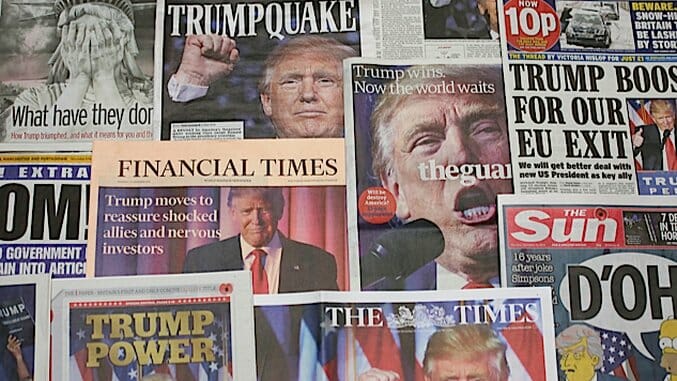The Mainstream Media’s Self-Inflicted Humiliation: When Did They Become so Pathetically Incapable?
Photo by Dan Kitwood/Getty
In a triumphalist op-ed written for the triumphant Breitbart, Holland’s Geert Wilder—one of Donald Trump’s several European counterparts who’ve seen their career prospects soar with the sprawling migrant crisis, for which the US can and should be blamed—hailed the Republican nominee’s victory as a crushing defeat for the corporate media.
“It is not just Hillary Clinton who was beaten yesterday; the media and the chattering classes have all been beaten,” writes Wilders. “It is wonderful to see how, in America as well as in Europe, the media pundits and the elites are taken by surprise.”
He makes an undeniable, and I think important, point. Not only has Trump (at least temporarily) put an end to two political dynasties and established an alternative campaign model for billionaires with dreams of world domination (Mark Cuban 2020?), he has also managed to single-handedly humiliate the entire media establishment. Without question, the reason why so many were so shocked by Trump’s victory was because we were told, both implicitly and explicitly, by nearly everyone who is supposed to know, that it couldn’t happen.
Never has a presidential candidate met with such feverish and monolithic resistance from the mass media. Across the spectrum, from the Washington Post to the Weekly Standard, Trump was excoriated on an almost hourly basis. For eighteen months, pundits at the New York Times churned out column after column, week after week, in which Trump and his disciples were put through the wringer. They wrote at length about Trump’s racism and sexism and Islamophobia. His latent fascism. His narcissism. His underhanded dealings as a businessman. The support from David Duke. They compared him to Hitler and Mussolini. They tried linking him to Vladimir Putin. They dug up dirt from twenty-five years ago. They dismissed as categorically wrong the suggestion that Trump’s phenomenal success could be ascribed, even partly, to economic grievances among middle- and working-class voters. It all boiled down to hate.
-

-

-

-

-

-

-

-

-

-

-

-

-

-

-

-

-

-

-

-

-

-

-

-

-

-

-

-

-

-

-

-

-

-

-

-

-

-

-

-








































